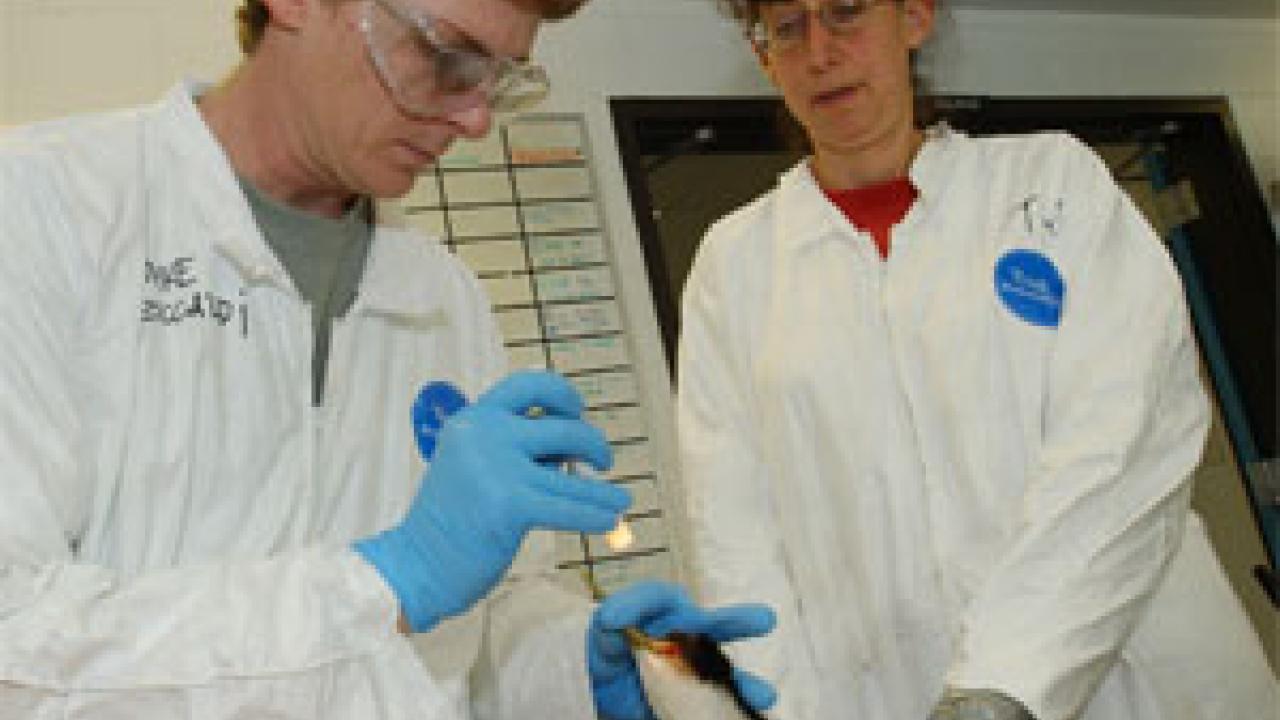UC Davis wildlife experts say the recent oil spill that soaked birds along the Southern California coast is not only the worst worldwide for wildlife in two years but also has killed a greater proportion of birds than usual.
More than 70 percent of the oiled birds treated at the UC Davis-run rescue center in San Pedro have died or had to be euthanized. That is a much higher loss than this team has experienced in other spills, said Michael Ziccardi, who is directing the birds' medical care. Ziccardi is a veterinarian at the UC Davis Wildlife Health Center and an international authority on the rescue and treatment of oiled wildlife.
Between Jan. 12 and Jan. 26 (Dateline's press deadline), UC Davis veterinarians, staff members and volunteers collected more than 1,500 oiled birds on the coast between Santa Barbara and Huntington Beach. Of those, about 315 were dead. About 860 birds later died while being treated or were so sick that they were humanely killed, which puts the death rate among birds found alive at about 72 percent.
"In the many spills we've worked on in the past 10 years, we have cared for more than 6,000 oiled birds, and have refined our practices to the point where we typically are able to save at least half of the live birds we find," Ziccardi said. "However, in this spill, something unusual is happening. It's frustrating because we don't know what it is. We are losing a lot of birds."
Usually, at this stage of a rescue, when the number of new birds coming in has slowed to just a few daily, the spill vets are concentrating on the happy task of identifying the healthy birds ready to be released. In this case, they are instead euthanizing dozens of suffering birds each day.
Jonna Mazet, a veterinarian who directs the UC Davis Wildlife Health Center and is also an expert on the care of oiled wildlife, said the actual number of birds killed in the spill could ultimately exceed 5,000. Studies of previous spills and their effects have concluded that for every oiled seabird that is found washed ashore, there are about 10 to 100 birds that died at sea.
That would make this spill the worst since the 2002 wreck of the tanker Prestige off Spain's coast. When the Prestige sank, the single-hulled tanker leaked 63,000 tons of fuel oil. A subsequent report by Spanish scientists estimated that more than 250,000 sea birds were killed. Yet only about 21,000 oiled birds were ever found, said Ziccardi, who worked in the Prestige rescue and leads the current operation at the San Pedro bird center.
In some cases today, Ziccardi and fellow Wildlife Health Center veterinarian Greg Massey are conducting animal autopsies, or necropsies. The birds are given thorough physical examinations. Samples of blood, tissues and organs are being sent up to the campus labs in Davis at the Veterinary Medical Teaching Hospital and the California Animal Health and Safety Laboratory. The lab tests may show that the birds' continuing illness is caused by oil poisoning, or a bacterial or viral infection, or some other toxin.
At the same time, Ziccardi and Massey are varying their treatment regimens, looking for a solution in the care-and-feeding aspects of the recovery process.
Mazet noted on the positive side that this was the first major test of the university's readiness for a major Southern California spill, and the Davis team and the facility it designed passed with high marks.
"The spill-response veterinarians and staff and the volunteers performed excellently," Mazet said. Added Ziccardi, "Our 700 volunteers were terrific, and the birds got enormous community support in donations of sheets, towels, Ensure and Pedialyte."
Officially named the Los Angeles Oiled Bird Care and Education Center, the San Pedro center is one of a chain of coastal rescue centers and programs that are collectively called the Oiled Wildlife Care Network. The network is the world's most advanced system of emergency centers for wild animals hurt in oil spills.
The $2.5 million, 12,000-square-foot San Pedro facility has specialized areas for bird intake, holding, washing, drying, isolation and recovery, as well as for food preparation, medical care and necropsy.
The Oiled Wildlife Care Network is managed by the UC Davis Wildlife Health Center, which is part of the UC Davis School of Veterinary Medicine.
The Wildlife Health Center is dedicated to the conservation of free-ranging wildlife through research and education. Its 10 years of veterinary care and scientific study of oiled birds, otters and other wildlife have established standards and practices that are now used worldwide for saving oiled animals. The research continues; using radio transmitters, the center will study the long-term survival rates of the birds being treated now.
The Oiled Wildlife Care Network is funded by the California Department of Fish and Game's Office of Spill Prevention and Response. The Fish and Game monies come from interest on the $50 million California Oil Spill Response Trust Fund, which was built from assessments on the oil industry.
While the rescue program is led by UC Davis, there are many wildlife organizations taking part. They include: Point Reyes Bird Observatory, International Bird Rescue Research Center, California Wildlife Center, Wetlands and Wildlife Care Center of Orange County, Santa Barbara Wildlife Care Network, the Marine Mammal Center at Fort MacArthur, Long Beach Aquarium of the Pacific, Wildlife Assist, Project Wildlife and SeaWorld San Diego.
More information about the Wildlife Health Center and its oil-spill research is online at: http://www.vetmed.ucdavis.edu/whc/.
